There is a toxic question that surrounds abused women: “why didn’t she just leave him?”
The answer, too often, is that many women that do leave get killed.
“The thing that I did not know that was so revealing to me was that anywhere between 50% and 75% of domestic violence homicides happen at the point of separation or after [the victim] has already left [her abuser],” says Cynthia Hill, director of HBO’s Private Violence.
“When I met Kit Gruelle, she would always point out: ‘Estranged husband. Ex-husband. Ex-boyfriend. Estranged boyfriend.’ It was always that she had tried to leave. She had done exactly what we think they’re supposed to do and she dies. And her children die.”
Gruelle, the center of Hill’s documentary, is a survivor of domestic violence herself, and is now an advocate for battered and broken women. It’s a job that requires constant vigilance. About one in four women will at one point in their lives be beaten or abused by someone they know. Each year about 4,000 women die because of domestic violence.
Hill focused her documentary on Gruelle, giving the audience an insider’s look on what happens to victims of domestic violence, why they stay and why they leave.
The Guardian sat down with Gruelle to talk about her journey, abusers and their tactics and the habit of blaming the victims, instead of their abusers. Below is an edited transcript of our conversation.
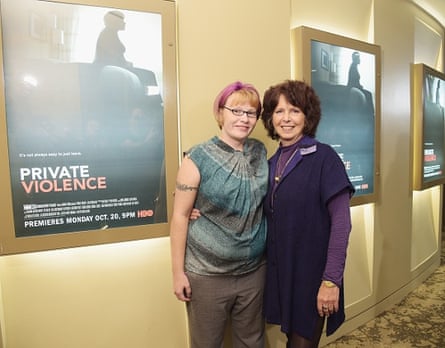
In the documentary, you mention that you have been previously abused by your husband. How did you transition to becoming an advocate who helps domestic violence victims?
A lot of the women who do this, certainly not all but a lot, have had a personal experience with it. For myself, I just felt very lucky that I survived and then took my sons out of the North Carolina mountains and down to the Chapel Hill area. A few years later, I saw an ad to become an advocate, went to the training, and it was just like finding a glove that fit perfectly. It was my calling. Understanding intimate abusive relationships was critically important.
But for me politically, it was also about understanding that the systems that battered women have to turn to oftentimes are just as oppressive as the abuser himself. I like taking on oppressive systems and trying to level the playing field a little bit. So it just worked.
I remembered the things that happened and that did not happen when I was going through it. I just wanted to make sure that everyone out there who is potentially a first responder to domestic violence victims – which is essentially everyone, but key people like law enforcement officers and healthcare providers and clergy – had some degree of understanding of how to listen to a battered woman. She’s the expert on what’s happening in her relationship.
There’s a scene in the movie where you’re training some first responders how to handle a domestic violence case. You emphasise that an abuser can exercise control over a victim with just one look. Why is this kind of training necessary?
Law enforcement officers have to fine tune their antennae for the behaviours that might not exactly constitute an arrestable offence, but that should indicate to that officer how much danger she is in.
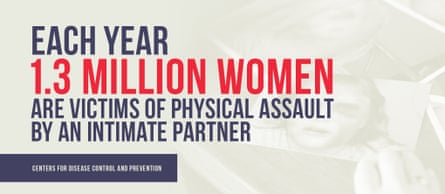
Because the reality of it is, for abusers, it’s almost like they have a toolbox and in that toolbox they have a variety of tactics – everything from a dozen red roses and “Oh, baby” and a night out on the town to threats to a gun. He will use any one of the tactics that he feels he needs to use to make sure that his position of power and dominance is maintained in the relationship.
An abuser has his toolbox. Is there a toolbox for domestic violence survivors? Are there certain skills that they have to learn?
They need to understand early on what to look for. Every single woman I have ever worked with, for the last now, close to 30 years, has always said to me: “He was the nicest guy I ever met when we first got together.”
We need to teach girls and young women to look for the warning signs and to know what they are early on and to be clear that jealousy and love aren’t the same thing. That when he starts to do things to make her feel controlled, telling her that she can’t hang out with her friends any more, [those are the warning signs].
Maybe he wants to be with her all the time and doesn’t want her to see her family or whatever. If she fine-tunes her own antenna, and then learns early on that she can’t fix him, that if he is someone invested in controlling her or other women that there’s nothing she can do to change that. Then maybe women won’t find themselves partnered with these guys, who see them as property and not as women.
I have been thinking about this lately. Abusers have enormous egos, an enormous need to be the centre of attention. They have a sense of entitlement. They expect everything is going to go their way all the time, and when it doesn’t, they reach for their toolbox.
I got this visual the other day that the man in an abusive relationship is the centre of that particular universe and women become satellites – just sort of rotating around him. It’s not a good relationship. Relationships, the ones that I have seen that are good, long-term, healthy relationships, they’re based on a fundamental sense of respect and equality. Period.
One of the tools in the abuser’s toolbox can be money and access to it. Women often don’t have the financial resources to leave.
This is one of the reasons why domestic violence programmws are so vital and the work that the advocates do is so important, because the advocates listen to her, find out what the needs are and then do whatever they can to help her access the resources that she needs to get out if she thinks that getting out is what she should do. Many battered women stay, because they think: “If I leave, I’m going to die.”
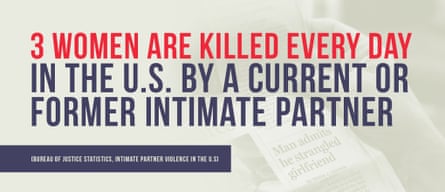
The other side of the resources issue is we tend to focus on - or frame battered women as being women with little to no access to finance. But there’s the other side of the coin and that’s women who are married to wealthy, powerful men.
Abuse happens at every socioeconomic level, and yet in the documentary a psychology professors writes on your report that that is not the case.
I can’t tell you how angry I was when I read that across the bottom of that page. Because over the years I’ve worked with women who are married to PhDs, who are heads of research and development at big companies, who are doctors, lawyers, professors, you name it. And sometimes the wives are doctors, lawyers and professors. But what people don’t understand is that what the offender wants to do more than anything else is get inside her head. Once he is inside her head, then he is the one that’s running the show, which again goes back to the tactics.
If she becomes afraid that if she doesn’t do things according to his dictates then there’ll be consequences, if she has been conditioned, then he has effectively inhabited her brain and now she is not thinking for herself. And I’ve seen that happen with women who are educated, smart, competent women, which is why this kind of violence is so insidious. It doesn’t come in like a tsunami. It comes in like constant [seemingly] gentle waves.
Throughout the documentary we see you clipping out newspaper articles on domestic violence. Why?
One of the things that I find the most annoying is our determination to blame women for male violence.
We don’t do it with any other crime. Say a bank has been robbed in your community. Maybe the bank has been robbed four or five times already. And the 911 call goes out. Law enforcement comes out. They interview the witnesses. They dust for prints. They do an investigation. When they are done with the investigation, they don’t go to the bank president and say:
“Why did you keep all that money here? We’ve already been out here four or five times. Do you like getting robbed? I can’t believe you are still doing business here. Why haven’t you moved your bank?”
We have to start asking better questions. Rather than “why doesn’t she just leave”, it’s “why does he abuse her” and “why does society drive the getaway car”.

There were some disappointing moments in the documentary where the justice system, and its many loopholes, don’t protect the victims of domestic violence. What would you like to see change in that area?
In America, we have got kind of a one-note-Charlie response – it’s either nothing or jail. Slap on the wrist or jail.
There’s a program in Tel Aviv, Israel, which I would love to see come to the US.
What they’ve decided in Tel Aviv a number of years ago is that telling women and children who had been abused that they then had to go into a shelter and leave behind their family, their friends, their schools, their jobs, their pets, everything they knew and hide out is wrong. Because on one hand, it’s saying to her: “OK, you have to reconfigure your life because of this violence.” And it’s saying to him: “We are going to expect that women are going to reconfigure their lives.”
Imagine if rather than calling shelters, shelters, which is kind of a warm, cosy term, we called them refugee camps?
Right, that’s kind of what they are.
That’s exactly what they are. They are refugee camps. And what they did in Tel Aviv is rather than have women and children flee to a shelter – and they still have shelters there – they said, “No, we are going to build a facility to send abusers to.” And men go there for four months stay. It’s much more appropriate response. It’s a strong political statement, because what they are saying Tel Aviv is: “We are not going to sanction his violence. We are going to as society hold him accountable.”
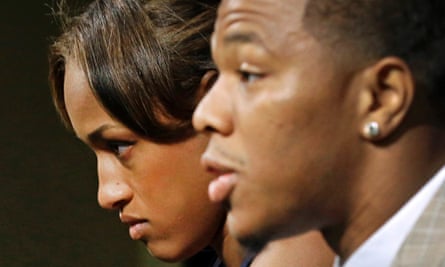
I think if we could do that in a thoughtful, comprehensive, legitimate way in this country, I think things would change dramatically.
Janay Rice, the wife of NFL player Ray Rice, suffered graphic abuse in a surveillance video that started a national conversation on spousal abuse. Do you think that now this incident will drive conversation? That something might change in the way we approach domestic violence?
I think it will. Thank God, Janay Rice is OK. And by OK, I mean she is not dead, because he could’ve killed her. I am very thankful that that didn’t happen.
It will be interesting over the months ahead to see what happens with them. For me and for those of us who do this work, we think it would be incredible if he would accept responsibility for what he did, number one. Number two, get the kind of counselling that abusive men need to get. Then, number three, if he would go public with it. If he would say: “This is what I have learned about men’s violence against women. I have a daughter and I have a wife that I love, and I am committed to doing my part to stopping men’s violence against women and here’s how I am going to do it. I am going to do it by talking about what I’ve learned.”
With him being an NFL player or a former NFL player, I think it could be huge. The same thing for Janay, I think if she decided that she wanted to sort of step out from underneath the waterfall that she has found herself under and start to understand the social pressures that she has had to deal with, and articulate those in a way that was meaningful to women and girls across the country, I think it could be huge.
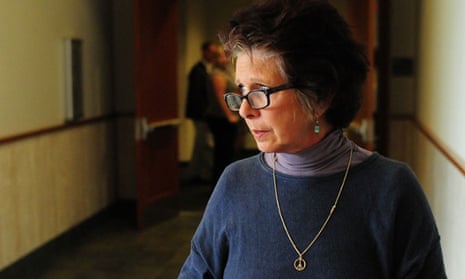
Comments (…)
Sign in or create your Guardian account to join the discussion